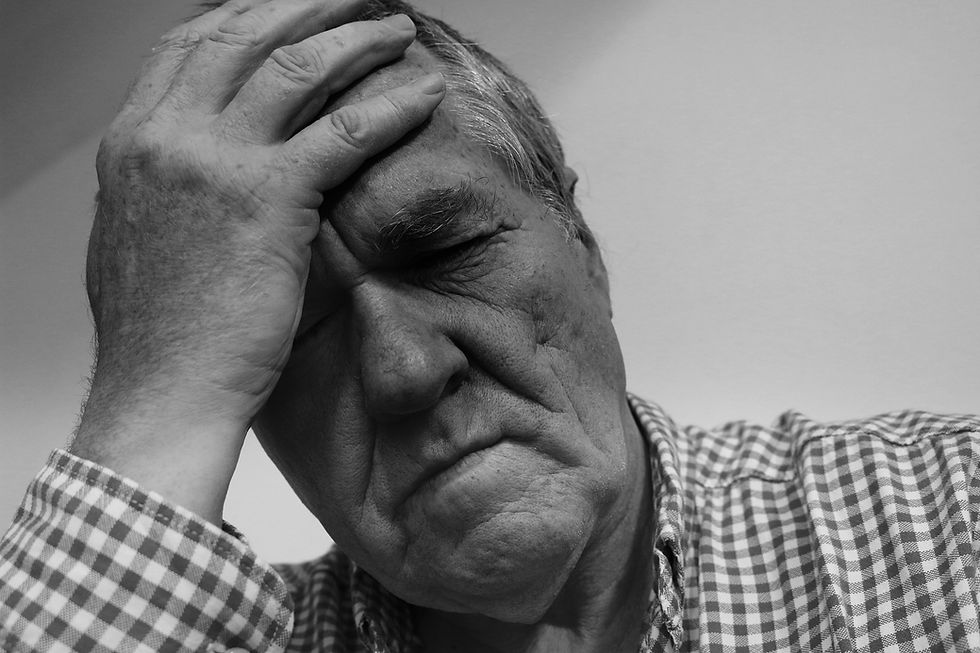Post-Concussion Syndrome in Burlington: How Physiotherapy Helps Recovery
- Folarin Babatunde PT PhD

- Jun 13, 2025
- 4 min read
Updated: Jan 24
Cogent Rehab Blog
Folarin Babatunde PT PhD MScSEM MScPT BScPTu
June 13, 2025
Most concussions heal within a few weeks. But for some people, symptoms linger for months — even when the initial injury seemed “mild.” This condition is known as post-concussion syndrome (PCS).
In this article, we’ll explain what PCS is, why symptoms may persist, and how Cogent Rehab physiotherapy in Burlington can support your recovery.

What Is Post-Concussion Syndrome (PCS)?
Post-concussion syndrome occurs when concussion symptoms last longer than three weeks. While many people recover in 2–6 weeks, PCS may persist for months or even years if not treated.
It can happen after sports injuries, car accidents, workplace falls, or everyday slips. PCS is often unpredictable — even a seemingly minor concussion may result in long-term euffects.
Common Symptoms of Post-Concussion Syndrome
Many people report that PCS symptoms are in many ways a continuation of the symptoms they experienced initially. PCS affects physical, cognitive, and emotional health.
Headaches and Migraines After Concussion
Recurring headaches are one of the most common lingering symptoms. They may feel like tension headaches or migraines and are often linked to neck strain.
Dizziness and Balance Problems in PCS
PCS often affects the vestibular system (inner ear + brain connections), causing tinnitus, dizziness, vertigo, and loss of balance.
Cognitive Symptoms: Memory and Concentration Issues
People with PCS may describe “brain fog,” slowed thinking, or poor concentration. Memory lapses and difficulty processing information are also common.
Emotional Changes and Post-Concussion Syndrome
Anxiety, irritability, mood swings, and depression can occur after concussion. These emotional effects may be as disabling as the physical ones.
Other Symptoms
People with PCS also report physical symptoms such as sensitivity to light and sound, fatigue, sleep disturbance, problems with vision
Why Do Concussion Symptoms Persist?
Not all PCS cases are the same. Symptoms may last longer due to:
A history of multiple concussions
Whiplash or neck injuries combined with head trauma
Pre-existing migraines or motion sickness
High levels of stress, anxiety, or depression
Returning to sports or work too soon
Understanding these factors helps guide the right treatment plan.
Post-Concussion Syndrome Physiotherapy in Burlington: Treatment Options
At Cogent Physical Rehabilitation Center Burlington, our physiotherapists specialize in helping patients with persistent post-concussion symptoms. Treatment may include:
Vestibular physiotherapy → to reduce dizziness and restore balance
Physiotherapy for headaches and neck pain → hands-on therapy, stretching, and posture correction
Vision therapy exercises → for blurred vision, eye strain, or difficulty with screens
Progressive therapeutic exercise → gentle aerobic activity to rebuild endurance safely
Cognitive Training (Brain HQ) → for attention, memory and brain speed
Return-to-work and return-to-sport planning → gradual, supervised progression to normal activities
Every PCS treatment plan is tailored to the patient, focusing on both recovery and prevention of future setbacks. Our clinic provides vestibular physiotherapy for dizziness.
Recovery Tips for Post-Concussion Syndrome at Home
While professional care is essential, these strategies can support recovery:
Pace activities with frequent breaks instead of “pushing through”
Get regular, quality sleep and maintain consistent routines
Stay hydrated and eat balanced meals
Limit screen time or use blue-light filters if sensitive to light
Reintroduce exercise slowly, following your physiotherapist’s advice
FAQs on Post-Concussion Syndrome and Physiotherapy
1. How long does post-concussion syndrome last?
It varies. Some people recover in a few weeks, while others may experience symptoms for several months.
2. Can physiotherapy help post-concussion syndrome?
Yes. Physiotherapy is highly effective for treating PCS by targeting dizziness, headaches, fatigue, and concentration issues.
3. Do I need a referral for post-concussion physiotherapy in Burlington?
No referral is required. You can book directly with a physiotherapist at Cogent Rehab.
4. Is it safe to exercise with post-concussion syndrome?
Yes — but only under supervision. Physiotherapists use graded, symptom-guided exercise programs that help without worsening symptoms.
5. What happens if PCS is left untreated?
Symptoms may persist or worsen, affecting work, school, sports, and daily quality of life. Early physiotherapy reduces this risk.
Final Thoughts: Post-Concussion Care in Burlington With Physiotherapy
Living with post-concussion syndrome can feel frustrating and exhausting. But with the right guidance, recovery is possible. At Cogent Physical Rehabilitation Center in Burlington, our physiotherapists provide personalized care to reduce symptoms, restore function, and help you return to daily life safely.
Start you journey to recovery from post-concussion syndrome with our Burlington physiotherapists.
Call 905-635-4422 or Book a post-concussion syndrome assessment online today to talk to one of our physiotherapists.
Sources
Cancelliere C, Verville L, Stubbs JL, Yu H, Hincapié CA, Cassidy JD, et al. . Post-concussion symptoms and disability in adults with mild traumatic brain injury: a systematic review and meta-analysis. J Neurotrauma. (2023) 40:1045–59
Hauptmann LK, Ashkanian M. Post-concussion syndrome is a neuro-cognitive condition. Ugeskr Laeger. 2017;13:179:V01170087
Skjeldal OH, Skandsen T, Kinge E, Glott T, Solbakk A-K. Long-term post-concussion symptoms. Tidsskr Nor Laegeforen. 2022;17:142.
Leddy JJ, Baker JG, Willer B. Active Rehabilitation of concussion and post-concussion syndrome. Phys Med Rehabil Clin N A. 2016;27:437-454.
McInnes K, Friesen CL, MacKenzie DE, Westwood DA, Boe SG. Mild traumatic Brain Injury (mTBI) and chronic cognitive impairment. A scoping review. PLoS One. 2017;11:e0174847.
Manley G, Gardner AJ, Schneder KJ, Guskiewicz KM, Bailes J, Cantu RC et al. A systematic review of potential long-term effects of sport-related concussion. Br J Sports Med. 2017;51:969-977.
Polinder S, Cnossen MC, Real RG, Covic A, Gorbunova A, Voormolen DC et al. A multidimensional approach to post-concussion symptoms in mild traumatic brain injury. Front Neurol 2018;
Ross EA, Hines RB, Hoffmann M, Jay K, Antonucci MM. Multi-modal neurorehabilitation for persistent post-concussion symptoms. Neurotrauma rep. 2023;12:297-306.
Rytter HM, Graff HJ, Henriksen HK, Aaen N, Hartvigsen J, Hoegh M et al. Nonpharmacological treatment of persistent post-concussion symptoms in adults: A systematic review and meta-analysis and guideline recommendation. JAMA Netw Open. 2021;4:e2132221.




Comments